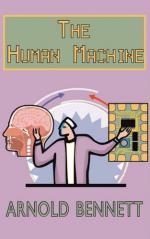In the matter of concentration, I hesitate to recommend Mrs. Annie Besant’s Thought Power, and yet I should be possibly unjust if I did not recommend it, having regard to its immense influence on myself. It is not one of the best books of this astounding woman. It is addressed to theosophists, and can only be completely understood in the light of theosophistic doctrines. (To grasp it all I found myself obliged to study a much larger work dealing with theosophy as a whole.) It contains an appreciable quantity of what strikes me as feeble sentimentalism, and also a lot of sheer dogma. But it is the least unsatisfactory manual of the brain that I have met with. And if the profane reader ignores all that is either Greek or twaddle to him, there will yet remain for his advantage a vast amount of very sound information and advice. All these three books are cheap.
XIV
A MAN AND HIS ENVIRONMENT
I now come to an entirely different aspect of the whole subject. Hitherto I have dealt with the human machine as a contrivance for adapting the man to his environment. My aim has been to show how much depends on the machine and how little depends on the environment, and that the essential business of the machine is to utilise, for making the stuff of life, the particular environment in which it happens to find itself—and no other! All this, however, does not imply that one must accept, fatalistically and permanently and passively, any preposterous environment into which destiny has chanced to throw us. If we carry far enough the discipline of our brains, we can, no doubt, arrive at surprisingly good results in no matter what environment. But it would not be ‘right reason’ to expend an excessive amount of will-power on brain-discipline when a slighter effort in a different direction would produce consequences more felicitous. A man whom fate had pitched into a canal might accomplish miracles in the way of rendering himself amphibian; he might stagger the world by the spectacle of his philosophy under amazing difficulties; people might pay sixpence a head to come and see him; but he would be less of a nincompoop if he climbed out and arranged to live definitely on the bank.
The advantage of an adequate study of the control of the machine, such as I have outlined, is that it enables the student to judge, with some certainty, whether the unsatisfactoriness of his life is caused by a disordered machine or by an environment for which the machine is, in its fundamental construction, unsuitable. It does help him to decide justly whether, in the case of a grave difference between them, he, or the rest of the universe, is in the wrong. And also, if he decides that he is not in the wrong, it helps him to choose a new environment, or to modify the old, upon some scientific principle. The vast majority of people never know, with any precision, why they are dissatisfied with their sojourn on this




